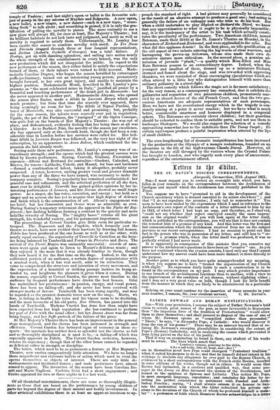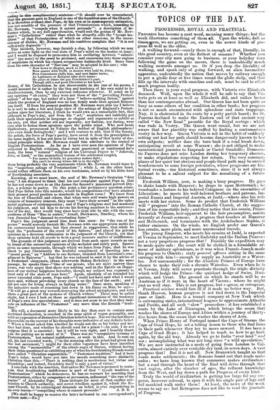FA,THEE NEWMAN AND ROMAN IIYSTIFICA TIONS.
SIR—With your permission, I resume the subject of Father Newman's bold claim to certain great names of the past, as more favourable to Rornanism than "the imperious force of the tradition of Protestantism" would allow them to show themselves ; and shall proceed to dispose of the case of one of whom Mr. Newman speaks as "compelled rather than persuaded." "There," he-says, "is Alexander Pope, a Catholic : who would discover it from the run of his poems ? " There nay be an interest beyond that of re- futing Mr. Newman's sweeping plausibilities in considering the extent of Pope's (Roman) Catholicity, and in analyzing the causes which prevented it from lying patent on the face of his poetry. That it may on examination be found in them, any student of his works must be aware. The. lines which assert that
" London's column, pointing to the skies, Like a tall.bully, lifts its head, and—lies ! "
are in themselves proof how Pope could disregard "Protestant tradition" when it suited his purpose to do so; and that he himself did not intend in his writings to disclaim any allegiance he ever paid to the Roman Church, is evidenced by a short correspondence with the French critic Racine, inserted in some editions of his works, though not in others. It would seem that Racine had intimated, in a cautious and qualified way, that some pas- sages in the Essay on Man favoured the-system of the freethinkers, and leaned to the opinions of Spinosa and Liebnitz. This notion Mr. Pope, in.-most energetic language, repudiates ; and doncludes his letter by as- serting his perfect coincidence in sentiment with Paschal and Arch- bishop Fenelon ; saying, "I shall always esteem it an honour to imi- tate the moderation with which the latter submitted his private opi- nions to the decisions of the Church of which he professed himself a mem- ber" : a profession of faith which Monsieur Racine acknowledges in a letter in this complimentary sentence—" It should ever be remembered, that tJte greatest poet in England is one of the humblest sons of the Church.", It is therefore evident.that Pope,-in his own, or in oouienporary estimation, was not sensible of the pressure of that'Protestantism which,' according to
Mr. Newman, "compels when it cannot persuade"-: in-
fluence of which, to my ,dull apprehension, would Auit the. genius of Mr. New- man's "Catholicism" rather than what ho absurdly calls the "tyrant tra- dition" of that Protestantism of which on other oceasiona, in the Moon- sistency of dislike, Mr. Newman and his confrZres complain that "it isnot sufficiently dogmatic " ! This incident, however, may furnish a clue, by following which we may arrive at some light on the real state of Pope's mind on the matter at issue ; and I would be disposed to pronounce him as oscillating between " submis- sion" (no more) to the creed he professed, and excursions into those regions of scepticism in which his chosen companions- habitually lived. Some lines from. his own character of "Narcisaa" may be adapted to his ease ; who
o Now bows to Dogma, meek as Fel:mien ; Now sneers with Swift, or doubts with bold St. John; Now Conscience chills him, and nowSatire burns, As Lightness or Religion take their turas: He plays at times the gay Freethinker's part, Though still a sad good Christian in his heart."
Hence, if his Catholicism be not discoverable in the ran of his poems, I would account for it rather by the bias and tendency of his own mind to la- titudinarianism, than by, any external.intluence whatever. If acted on by any opinions " ab extra," they were not those of the " prevailing Protest- antism' of her age, but rather of a loose " believe-nothing Deism," against which the protest of England was less 'firmly made than against Roman- ism itself. If from his present position Mr. Newman were .able (as.I believe he is not) to take a fair and large view of the actings of England's Protest- antiam upon her literature, I think he would own as a remarkable fact, that although in Pope's day, and from his " set," scepticism and infidelity put forth their speculations in language as elegant and arguments as subtle as his own, yet that neither wit nor ingenuity, nor fashion, nor daring, were ever able to fasten these opinions upon the public mind. Who now -heeds Shaftesbury, pronounced by Voltaire the boldest of English .philosophers? who even reads Bolingbroke ? and I will venture to add, that if the beauty, the polish, the force of Pope's poetry, have saved it from the proscription of the same neglect, it has not been in virtue but in spite of that laxity of doc- trinal principle which Mr. Newman 'would fain attribute to the control of English Protestantism. As far as I have ever seen the opinions of .Pope subjected to English criticism,. those most questioned or condemned-have been, the loose ' natural " religion of bis Universal Prayer to " Jehovah, dove, or. Lord," or the unpractical truism of his celebrated couplet, " For modes of faith, let graceless zealots light ; His can't be wrong whose life is in the right " :
these being probably the very sentiments which Mr.. Newman would trace to the "imperious aotiugs of Protestantism" ; while I, on the other hand, would rather affiliate them on his own tendencies, acted on by his little knot of freethinking associates.
Knowing, as we must know, the seal' of Mr. Newman's Oratorian "first love," :I am disposed to think that his real complaint .against Pope is, that he has not come down to na like James the Second's pensioned pervert Dry- den, a polemic in poetry. On this point a fair preliminary question arises. Had Pope fallen into this mistake, mould his compositions ever have attained their present proud position as standards in English verse ? We know from the fate of Churchill and others, that when men will wastehigh powers on subjects of transitory interest, they ,must" have. their reward" in the ephe- meral applause of contemporaries; and if Pope's religious seal had mastered his judgment, and led km to devote his flowing numbers to the controver- sies of his day, they would long since have slept side by side with the com- positions of those "-flies-in amber," Arnall, Blackmore, Smedley, whom his own Bunelad has "damned to everlasting fame."
Pope's fine judgment saved him from this error : for "the run of his poems" would scarcely. furnish Mr. Newman with one appropriate-motto for his controversial lectures; but they abound in suggestions, that while he kept the "profession of the creed of his fathers," and placed his private opinions in a decorous submission to the judgment of the Church, yet that those opinions held all creeds to be in a great measure matter of indifference.
The grounds of this judgment are derived from such-spare records as can be.found of the unreserved opinions of the secluded and siekly poet. Spence gives us some memoranda, through which we learn. from Pepe, that he was about to pay, Christianity the doubtful compliment of inserting into a "-moral poem," an- "Address to our Saviour, imitated from. Lucretius's com- pliment to Epicurus" ; but that he was induced to omit it by the advice of a Protestant clergyman, (Dean Afterwards Bishop Berkeley) : in the same passage, he speaks thus—"One of our priests, who- are more narrow than yours, was very angry that there was nothing said in. -the Epistle on Happi- ness of our eternal happiness hereafter, though my subject was expressly to treat only of the state of man here." Again, speaking of an intended but never executed ethic poem, Pope said—"I could notimve-said what I would have odd, without provoking every church on the face of the earth ; and I did not care for living- always in boiling water." Once more, speaking of the inductive mode of reasoning laid down in his Essay on Man, he says— "It will go a great way towards destroying the school metaphysics, and -with them a great part of the systems of Church writers." These may be called slight, but I own I look on them as -significant intimations of the tendency of Pope's own free speculations • and it does not seem to me that they indi- cate an influence of the.," Protestant" Any more than the banish "tradi- tion."
His will, a document more likely in his day. than ours to contain some doctrinal declaration, is couched in the same spirit of vague generality, and with no expression of distinctive Christian belief or hope. Nor are the last straws discernible on the current of his thoughts more indicative of any definite belief. " When a friend asked him whether he would not die as his father and mo- ther had done, .and. whether he should send for a priest ?—he said, I do not suppose that it 'as essential ; but it will be very right, and I heartily thank yau for putting me in mind of it." There was no " compulsive tyranny of Protestantism," but natural indifference, at -work in this. And to sum up all, his last recorded words, ("in the morning after the priest had given -him the last sacrament,") might for their ethic vagueness have been inscribed among the "memorabilia" of the ethnic .sages of Greece, without having their claim questioned as exhibiting any of what his freethinking friends would have called " Christian superstition." " Protestant tradition, ' had it been Pope's tutor, would have put into his mouth something more distinctly Christian than this—" There is nothing that is meritorious but virtue and friendship ; and indeed, friendship itself is only a part of virtue." I conclude with the assertion, that.unless Mr. Newman is prepared to main- tain that freethinking indifference is part of that " tyrant tradition of Protestantism" which he denouncer', he has no warrant for asserting that Protestantism, either by -compulsion or persuasion, influenced " the run of the poems" of Alexander Pope. These indicate far more of that sarface sub- mission to Church authority, and secret rebellion -against it, which the Ro- man Church, by its extravagant demands on belief, is ever engendering in
its own bosom— 'compelling where it cannot persuade." A. B. R. {We shall be happy to receive the letter indicated in our correspondent's private note.—En.



























 Previous page
Previous page